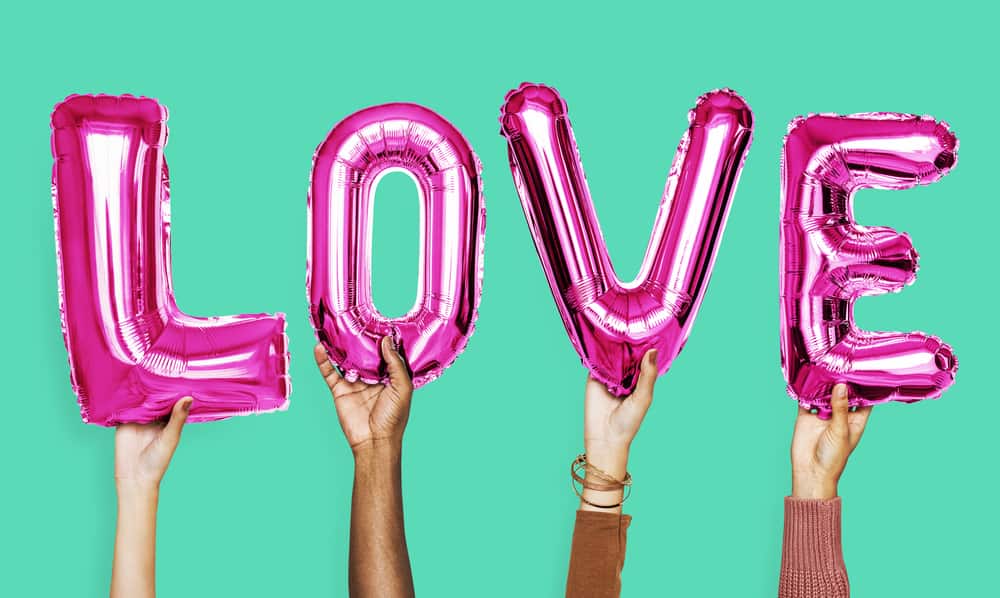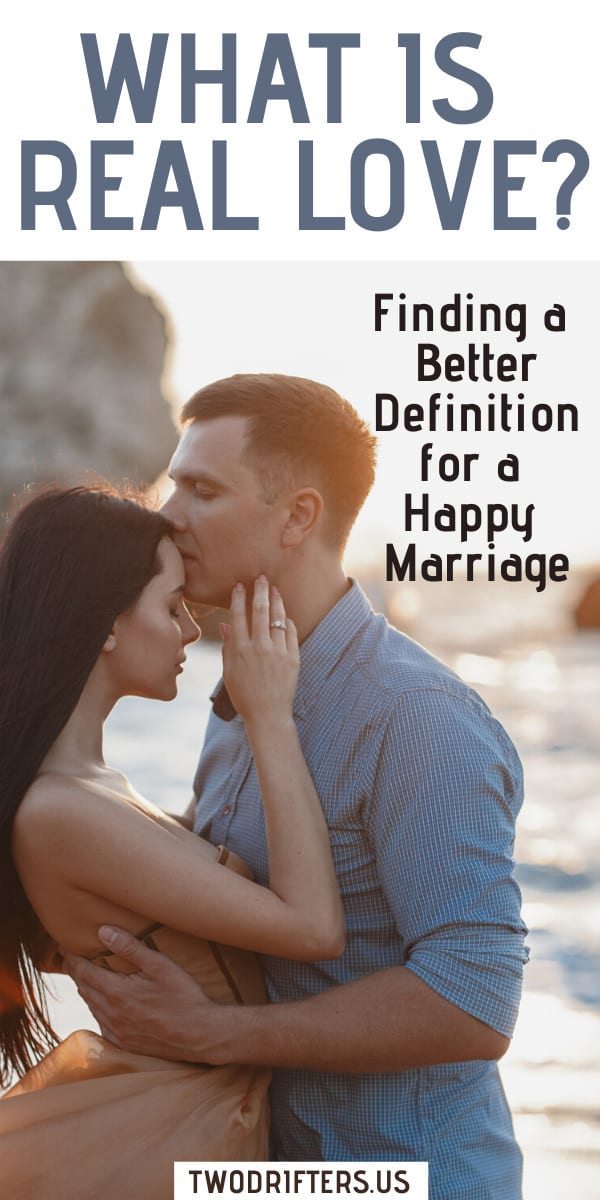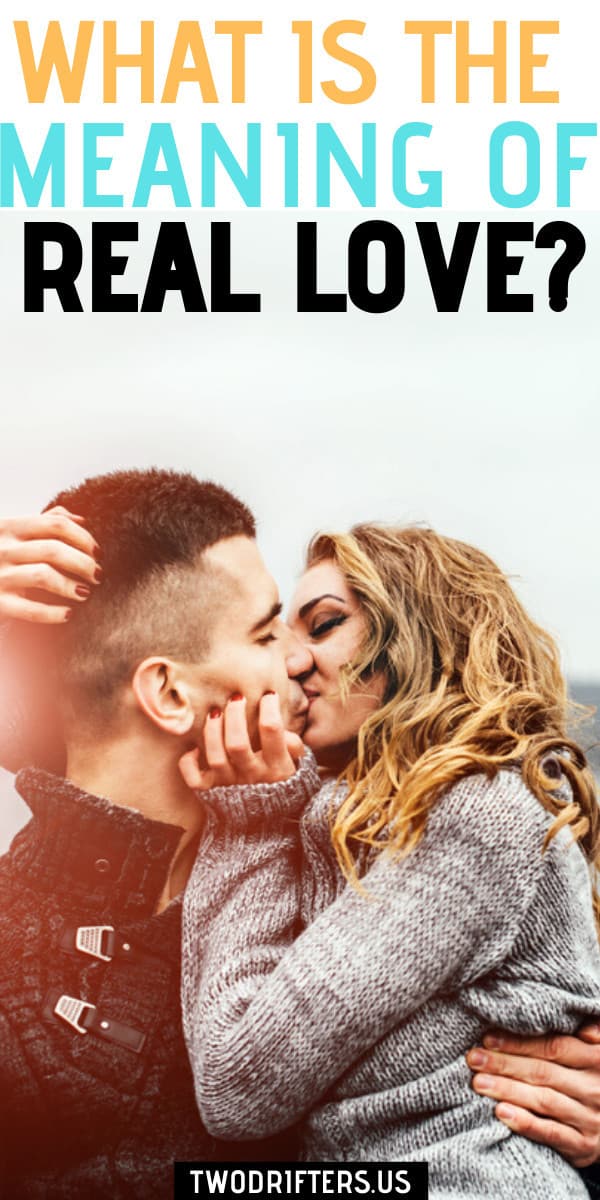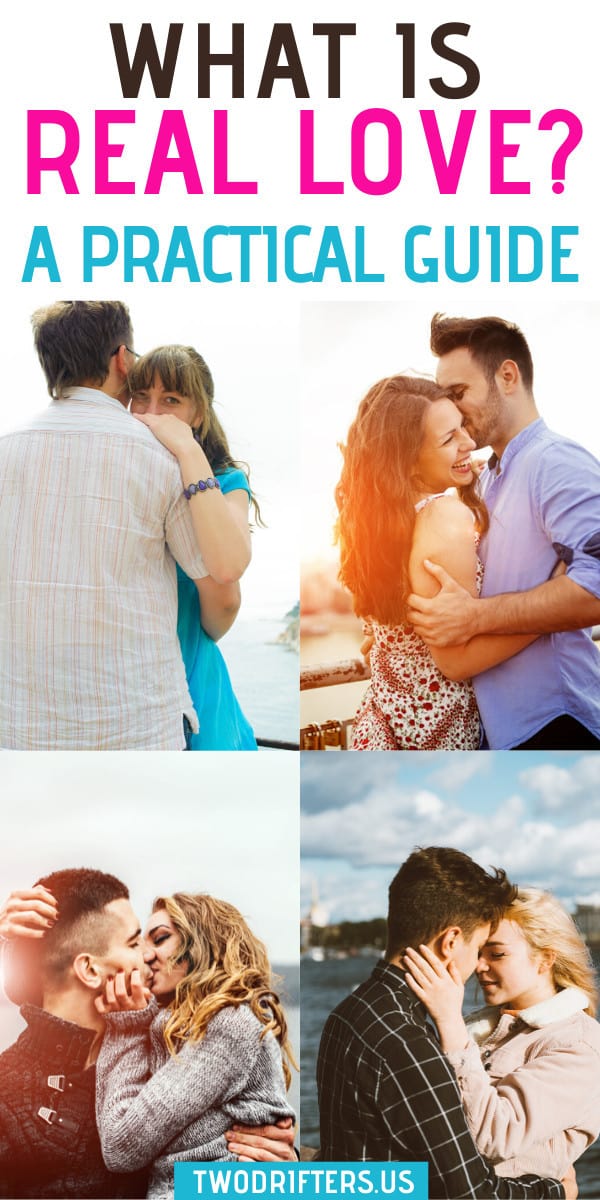This post may contain affiliate links. Read our disclosure page for full details.
What is love? (Baby don’t hurt me, don’t hurt me, no more)
Okay, obligatory 90s Haddaway reference out of the way, let’s get serious. This post is all about answering the question: what is real love. This is, without a doubt, a huge, massive, complicated, profound question. It’s up there with what is the meaning of life and what are we here for?
Let me begin by saying I don’t claim to have the answers. I’m a human being stumbling my messy way through this world just like you are. So I don’t have the truth about love. But, what I do have is a sincere interest in studying and learning about love. I am obsessed with love and have dedicated a lot of my life to learning about it and discovering it as best I can.
I also have what I would consider to be a happy marriage that has love in abundance. And though I’ve only been married just over 4 years and I don’t yet have decades of marriage experience under my belt, I can tell you this: I’m in it for life.
My marriage is everything to me.
Love is everything to me.
So you can feel pretty good that I have at least some kind of handle on it, and that my intentions are as pure as can be. The world of love is amazing and perhaps ultimately beyond explanation, but in this post, I’m going to do my best to define what it is, distilling down my own experience, the research of experts, and hopefully some common sense.
When Love Meets Anxiety
One of my main reasons for writing this post is because I am a person who suffers from anxiety. So does my husband. And in truth, so does practically everyone I know. While anxiety can affect many different areas in our lives, for me and Nathan, relationship anxiety was one of the ones we dealt with in the beginning of our relationship. (See also: Reassurance Seeking, Separation Anxiety)
In my research, I found that there are many, many men and women experiencing a lot of these same types of anxieties and fears. You are definitely not alone if you obsess about your partner’s feelings for your or question your own feelings in relationships.
I learned a great deal from the work of therapist Sheryl Paul and her relationship anxiety e-courses. One of the primary things she talks about is how society’s common messages about love, sex, and relationships are often incredibly warped. What this leads to is a general misunderstanding of what love is and how to be in a relationship.
Society’s incorrect relationship ideas are literally everywhere, and it’s no wonder that we fall victim to them. Some of what I’m talking about are ideas like soulmates, finding “the one,” the need to feel head-over-heels-in-love, and much more. Let’s talk about those real quick.
Some Myths About Love
Our notions about love come from many places, including popular culture and media, but a lot of the ideas have simply become ingrained over time. While there are definitely movements towards a more realistic view of love in today’s world, it’s pretty common to hear the same tropes we’ve been talking about for years. [Read more common relationship myths here]
- Needing to find the One
Have you ever been told: he’s out there. You just need to find the right One; your Soulmate.
Blargh. I have zero interest in the idea that there is one special person for everyone out there on this big-ass planet. To me, that’s not a magical idea, it’s a futile one. It’s an impossible goal, with no other outcome than frustration and anxiety.
- Looking for Your Other Half (“You Complete Me”)
Another myth says that you’re incomplete until you find that better half. Again, ew. You are not an incomplete person without a partner. You are not “nobody til somebody loves you.” This is a silly idea and it can do a lot of harm.
- Needing to Be Sure / Not Having Doubts
Do you buy into the idea that you need to be 100% certain when you’re with someone that they are the person you want to be with? If you have doubts, does that mean don’t? (A lot of people think it does).
- Overblown Expectations
Has society influenced your relationship expectations? Do you believe that love should be like a romantic comedy? Should proposals be over-the-top declarations of romance? Should you have intense, “in love” feelings forever? If those feelings end, does that mean it’s time to end the relationship?
- Emphasis on Intense Feelings
Speaking of feelings, are they meant to be as dramatic as we envision? Is love really a heart-exploding event filled with nonstop passion? If we don’t feel intensely, are we in the wrong relationship?
It’s these kinds of considerations and questions that lead many of us into anxiety, or at the very least, confusion about this love stuff. These are the things I’m going to tackle today.
What is Love- The Science of Love
Okay, so like, why do we even love? What’s that about? Is it all a biological drive to procreate? Is love real? Is it just chemicals?
I’m most definitely not a scientist, but according to those who are, biology seems to be responsible for our initial attraction to potential partners as well as our eventual attachment (via bonding hormones). BBC Science breaks love down into three phases: Lust, Attraction, and Attachment.
So science is definitely at least partly responsible for our drive and ability to love. But we know it goes far beyond simple neurons, pheromones, and chemical reactions in the brain. There’s something about love that we can’t seem to fully put our hands on. What is it that makes love challenging, painful, beautiful, and mysterious? We need to go beyond the physical and psychological facts about love.
Love is Indefinable and Supernatural
So if love isn’t all of these mystical, woo-woo things like soulmates, but it also isn’t just science, what is love actually? What is the meaning of love? Where does love come from?
My lack of belief in soulmates shouldn’t lead you to believe that my views on love are purely practical and scientific. On the contrary, while I don’t believe in mystical, fateful partnerships, I am a Christian, and I do believe in God. What I believe is that God is Love, and it is God who imbues us with the ability to love. My favorite verse says “We love because He first loved us.” I honestly do think it is as simple as that. And Jesus displayed the true meaning of love by His sacrificial death on the cross for us. But that’s a story for another time. (Or whenever, feel free to contact me and I’m happy to talk about my Faith).
Essentially, I think it is inherent in our human nature to love. This doesn’t necessarily mean we are all meant to be in romantic relationships, but I do think we each have the capacity to love and care for other people.
Also, I want to note that my definitions of love and ideas about real love are applicable to people of all faiths. So don’t be turned off if you’re not religious or spiritual. These ideas are not exclusive to Christian marriages or relationships; my views on the why’s of love are certainly influenced by my Christian faith, but ultimately, the ideas I’m going to talk about are 100% practical, real-world, common sense, good relationship stuff that really can work for anyone.
What is Real Love?
Answering this question in a few thousand words is like trying to explain quantum physics (at least, I assume). But I’m ready to try! At the very least, I can shed light on the essentials of good solid true love and what goes into a loving relationship. This may not be the complete definition of love, but I think you’re going to find it helpful.
In the end, we may never have a full understanding of what love is, and part of that may be because love means different things to different people. I’m hoping that by sharing my own thoughts on authentic love, I can help you sort through your own views on what it means to love another person.
How Do You Know if It’s True Love?
“True love” is another one of those buzzwords that I think is kind of meaningless. What makes something true? For the purposes of this post, let’s not give the term true love any extra weight.
How do you know love is real? How do you know if it’s true love? If you’re a person, and you’re doing it: loving, that is. Simple as that.
That’s the short answer. For the long answer, keep reading.
Redefining Love
Finding Love
In our quest for understanding and finding real love, we first need to ask one question: who loves?
I’ll tell you who. Messy, imperfect people like you and me. Humans with hearts.
People who screw up over and over and will likely do so again in the future. It’s important to grasp this concept right from the start because already it dramatically reframes our perspective on love. It involves two people who are going to make a big ol’ mess, and that is completely okay.
Knowing this, in some ways, takes the pressure off, I think. None of us are really “good at relationships” after all. We’re each just stumbling through and trying our best. So relax and know that you’re bringing your whole self to a relationship, warts and all. This also means your partner (or potential partner) is doing the same.
Why is Love So Hard?
It also reminds us that love is not necessarily easy. (Another myth by the way. Love goes through seasons and challenges and while there are periods of bliss and fun, oftentimes, love is difficult and painful. This is normal, even in happy relationships).
If love is natural to us as people, and it’s a choice we are able to make, then why is love still so darn difficult? Again, it’s probably because it involves human beings. We’re not just flawed, we’re also wounded, and we bring baggage aplenty to our relationships.
In his essay, Absolute and Relative Love, John Welwood says that there is a disconnect between “absolute love—the perfect love we can know in our heart—and relative love, the imperfect ways it is embodied in our relationships.” He goes onto say that relationship problems are born of “wounds of the heart” which we each contain.
Put another way, the issues we have are going to show up in our romantic relationships, and we can’t avoid them. My fear of abandonment from events in my past? That came with me into my current relationship. Your challenges with trust? Those will rear their head in your next relationship.
Knowing that we carry these nuggets of pain is half the battle, because it shows us that (many of) the problems we have lie within us. They are not caused by other people. When you have conflict in your relationship, instead of assuming the fault is your partner’s, you can reflect on your own brokenness. How is your past contributing to your present conflicts? Is this something you can work on in yourself? (A great reason that I think everyone can benefit from professional therapy). Being to face up to your own crap is a huge part of being in a successful, mature relationship.
Read Next: 7 Habits of Happy Couples
Is Love a Feeling?
Second, how does love work? Is it a feeling, an emotion that overwhelms us? This is my favorite relationship myth to debunk, because I am a huge believer in the idea that love is a choice and love is an action.
C.S. Lewis wrote, “Love is not affectionate feeling, but a steady wish for the loved person’s ultimate good as far as it can be obtained.” I’m enamored with this quote because it continually reminds me that loving my husband involves working towards his ultimate good. To me, that is all about action, and all about intention. Whenever I think about what it means to love my husband, I know that acting in a loving manner and taking actions/making decisions from a place of love is what it boils down to.
Does that make sense?
Let me put it another way. Loving somebody means moving towards them in love even when you don’t feel like it. Even when you’re mad at them. Even when you aren’t feeling particularly in love. Even if you’re feeling unattracted to them.
Real love transcends feelings, which are fleeting and cannot be counted on. Feelings don’t last. Actions, choices, and intentions DO.
So when you love a person, you LOVE them. It’s something you do, not something you feel. This is what makes for marriages that last decades.
And what’s amazing is, research shows that loving actions actually generate feelings. So through the action of love, we can often respark our feelings.
More on that here: Love is Action
That Loving Feeling
Feelings are okay too! I love feelings and I feel lots of them! A loving relationship will have times of good feelings, and ideally, lots of them.
In a long-term relationship, you’re not going to always feel lovey-dovey, and it’s important to note that. But, I think if you’re making an effort each and every day in your marriage and prioritizing your relationship, you’re going to feel those feelings as a natural byproduct. This is why it’s so important to give your relationship the time and attention it deserves, learning how to be a better partner, making time for intimacy, date nights, and having fun together. The very best relationships are those that are constantly maintained and lovingly cared for.
Some helpful resources for better relationships:
- Why Friendship in Marriage is So Important (And How to Keep It Strong)
- How to Strengthen Your Marriage Every Day
- What a Husband Needs From His Wife: 5 Essential Things
- 150 Deep Conversation Starters for Couples
- 5 Tips for Better Communication in Relationships
Changing Our Love Beliefs
Let’s go back through those love myths we talked about earlier. We can now reframe them as we approach from our new definition of real love.
Needing to find the One- Finding the Right One For You
There’s not just one person for you out there. You could potentially be happy and successful in relationships with many different people. I do think you can find “the right one for you“, a great person who you are attracted to and compatible with, particularly when looked at from the perspective of knowing that no one is perfect and all are flawed. There’s no Mr. or Mrs. Right.
Looking for Your Other Half (“You Complete Me”)- Loving Yourself As You Are
Know that you are a person of value who is fully deserving of love. You are worth it. You deserve a wonderful relationship.
Knowing your value is a big part of choosing the right partner. When you know what you deserve and what a healthy relationship looks like, you can avoid toxic partners, or simply avoid wasting your time with incompatible jerks. (See: 9 Signs You’re With the Wrong Person)
It also means that you are comfortable on your own as a single person. You’re not rushing into a relationship with any old dope just because you’re desperate for someone to “complete you.”
Needing to Be Sure / Not Having Doubts- Accepting That Doubts are Normal and Healthy
Have you ever wondered if you love your partner “enough?” Or do you sometimes have doubts about if it’s the right relationship for you?Aside from the presence of serious red flags, a lot of these doubts can simply be manifestations of anxiety. This is particularly true if you tend to ruminate on the same things over and over, and especially if you’re in an otherwise happy, safe, and healthy relationship.
First, know that doubts are beyond okay, especially when you’re in a long-term relationship, engaged, or married. Making a potential lifelong commitment to another person is HUGE; of course you’re going to feel some trepidation about it. Doubt is not necessarily a sign that something is wrong in your relationship, but instead likely points to some inner work you need to do around your own fears and insecurities. Or, it’s just the simple doubt of dealing with something major.
Second, don’t panic, and be sure to check out Sheryl Paul’s courses if this sounds like something you’re dealing with.
Overblown Expectations- Realistic Expectations
The more we learn about real love, the more we start to discover what healthy expectations look like in a marriage or long-term relationship. We see that we should not look to another person to complete us or to meet all our needs and fulfill all of our desires and expectations. We begin to understand that love is more about what we do for our partner than about the way we feel. And ultimately, this results in more satisfaction in our lives, and relationships that are truly more loving.
Emphasis on Intense Feelings- Less Focus on Feelings
We don’t worry about our feelings, knowing that they ebb and flow and that is normal and realistic. Understanding the concept of love vs being “in love” helps us to weather those times when we’re not feeling our most romantic or connected and realize that we can take actions (loving actions!) to help move through these seasons.
We also are filled with confidence because we know that love isn’t something that just happens to us. We are not subject to the whims of fate. Instead, we are in control of who we love and the decisions we make about our relationships. I find that incredibly empowering and it makes me feel like love, being a choice/action and not a feeling, is far more profound than if it were just something that “happened to us.”
Keeping Love – How Do You Make Love Last?
Does understand love make it easier to succeed in your relationships? I think it absolutely does! The concepts that I’ve talked about in this article are so fundamental, I think that grasping what real love is will influence and inform all your decisions for the better. But keep learning about love and relationships, and never stop growing as a person. That’s really the key to everything in this life. I’m not going to stop being a student of love and I hope you’ll stay one, too!
You might also like:
- Relationship Advice for Couples: 12 Principles for Lasting Relationships
- 40 Married People Share their Best Marriage Advice for Newlyweds
- The Ultimate List of Real Relationship Goals for Couples
- 30-Day Relationship Challenge for Couples
- How to Be a Better Wife | How to Be a Better Husband

Amy Hartle is the author of Do You Love Me? How To Stop Seeking Reassurance in Relationships, a book on reassurance seeking and relationship anxiety. Both her book and this blog are born of personal experience; Amy shares expert relationship advice from the lessons learned during her own 10+ years with her husband, as well as couples travel tips and romantic getaway recommendations, all gleaned while traveling the world together.








